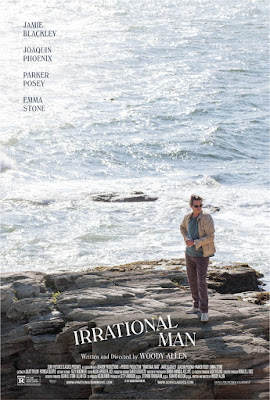Irrational Man
That mixture of self-importance and self-dismissing fluff is particularly pronounced in Allen's latest film, the grating shaggy-dog story Irrational Man. The film seems divided against itself on a fundamental level: it announces its lack of sympathies with protagonist Abe Lucas in its title, then throws all its narrative sympathy in Abe's direction. Some critics have read the movie as reflecting Allen's public fight with adopted daughter Dylan Farrow in 2014, with The New York Times as forum and intermediary. Irrational Man has been read as the latest salvo in that battle, given its contemptuous view of the legal system and its focus, so familiar in Allen's films, on the overwhelming attraction younger women have for troubled older men. But while Allen's state of mind may have crept into the script, Irrational Man hardly seems clear-headed enough to serve as any sort of manifesto. It feels telling, though, that while the film's protagonist is an unrepentant, cold-blooded killer, the movie's real villain for most of its runtime is the younger woman who has a crush on him, and won't take no for an answer.
What I liked about Irrational Man, even with some of its familiarity in the Allen world - professor with a younger student romantically, questions of morality, what it means when PURE luck really defines what happens for people - is that it was genuine about how its characters saw and changed with their views on the world, and that on its own you get wrapped up in the question of "Will he really get away with this?" To be sure, this question was asked with greater intellectual rigor in Crimes & Misdemeanors, and Match Point had an even tougher, bleaker view of what it means for people to get ahead in the world no matter who stands in heir way. But all three of these movies seem to make up a trilogy - maybe we can call it his 'Dostoyevsky' series - with this one being what I should think is the capper of them. Now it's not an older businessman or a young upstart, but someone who has spent his life trying to figure out what it means to live a meaningful life in theory vs practice.

Sem comentários:
Enviar um comentário